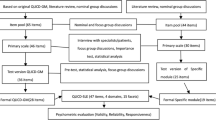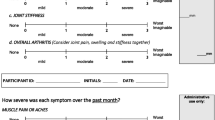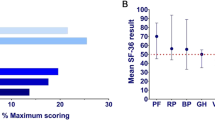Abstract
LupusPRO is a disease-targeted patient-reported outcome measure that was developed and validated from and among US patients with systemic lupus erythematosus (SLE). We herein report the results of the cross-cultural adaptation and validation study of the Turkish translated version of the LupusPRO. Turkish LupusPRO and the Medical Outcomes Study Short Form (SF-36) (Turkish) were administered to the Turkish lupus patients. Disease activity was ascertained using the physician global assessment (PGA), Safety of Estrogens in Lupus Erythematosus National Assessment–Systemic Lupus Erythematosus Disease Activity Index (SELENA-SLEDAI), and flare (defined by LFA—Lupus Foundation of America). Disease damage was assessed with Systemic Lupus International Collaborating Clinics/American College of Rheumatology damage index (SDI). Also, second Turkish LupusPRO tests were given to the patients to be completed within 2–3 days and sent back to us. Internal consistency reliability, test–retest reliability, and convergent and criterion validity (against disease activity or health status) were tested. All reported p values are two-tailed. The conceptual framework of the LupusPRO was evaluated using confirmatory factor analysis appropriate for categorical data. One hundred two SLE subjects (94 % women) were enrolled. The median (IQR) age and mean disease duration (±SD) were 38.5 (18) years and 60.3 (±56.3) months, respectively. The mean ± SD, SLEDAI, and SDI scores were 3.1 ± 3.7 and 0.52 ± 0.75, respectively. There were 25 patients who had flares at the time of study. Forty-two patients with no change in their health status completed and sent back the second LupusPRO test and were included in the test–retest analysis. Test–retest reliability of LupusPRO domains ranged from 0.87 to 0.97, while internal consistency reliability of the domains ranged from 0.63 to 0.94. Convergent validity with corresponding domains of SF-36 was present. Health-related quality-of-life domains performed well against disease activity measures (PGA, total SLEDAI, LFA flare, and SF-6D—overall health status), establishing its criterion validity. Item-to-factor loadings representing the hypothesized item-to-scale relationships were satisfactory. The model fit for the hypothesized item-to-scale relationships was also satisfactory. The Turkish version of the LupusPRO is valid and appears to perform comparably to the English and Spanish language versions. It can be used as a patient-reported outcome parameter in clinical trials, as well as longitudinal studies for testing responsiveness to change.
Similar content being viewed by others
References
Alarcón GS, McGwin G Jr, Brooks K et al (2002) Systemic lupus erythematosus in three ethnic groups. XI. Sources of discrepancy in perception of disease activity: a comparison of physician and patient visual analog scale scoresb. Arthritis Rheum 47(4):408–413
Jolly M, Utset TO (2004) Can disease specific measures for systemic lupus erythematosus predict patients health related quality of life? Lupus 13(12):924–926
FDA Guidance on Patient Reported Outcomes. [http://www.fda.gov/cder/guidance/index htm 2006]. Accessed 29 Jul 2013
Jolly M, Pickard AS, Block JA et al (2012) Disease-specific patient reported outcome tools for systemic lupus erythematosus. Semin Arthritis Rheum 42(1):56–65
Jolly M, Block JA, Mikolaitis RA et al (2011) Spanish LupusPRO: Cross Cultural Validation Study for Lupus. Arthritis Rheum 63(10s):S725
Guillemin F, Bombardier C, Beaton D (1993) Cross-cultural adaptation of health-related quality of life measures: literature review and proposed guidelines. J Clin Epidemiol 46(12):1417–1432
Hochberg MC (1997) Updating the American College of Rheumatology revised criteria for the classification of systemic lupus erythematosus. Arthritis Rheum 40(9):1725
Ware JE (1996) The SF-36 Health Survey. In: Spiker B (ed) Quality of life and pharmacoeconomics in clinical trials, 2nd edn. Lippincott-Raven, Philadelphia, pp 337–345
Petri M, Kim MY, Kalunian KC et al (2005) Combined oral contraceptives in women with systemic lupus erythematosus. N Engl J Med 353(24):2550–2558
Ruperto N, Hanrahan LM, Alarcon GS et al (2011) International consensus for a definition of disease flare in lupus. Lupus 20(5):453–462
Gladman D, Ginzler E, Goldsmith C et al (1996) The development and initial validation of the Systemic Lupus International Collaborating Clinics/American College of Rheumatology damage index for systemic lupus erythematosus. Arthritis Rheum 39(3):363–369
Brazier J, Roberts J, Deverill M (2002) The estimation of a preference-based measure of health from the SF-36. J Health Econ 21(2):271–292
Hays RD, Anderson R, Revicki D (1993) Psychometric considerations in evaluating health-related quality of life measures. Qual Life Res 2:441–449
Mplus User’s Guide [computer program]. Version 1. Los Angeles: Muthén & Muthén; 1998.
Hu L, Bentler PM (1999) Cutoff criteria for fit indexes in covariance structure analysis: conventional criteria versus new alternatives. Structural equation Modeling 6:1–55
McElhone K, Abbott J, Teh SL (2006) A review of health related quality of life in systemic lupus erythematosus. Lupus 15:633–643
Furie R, Petri M, Zamani O et al (2011) A phase III, randomized, placebo-controlled study of belimumab, a monoclonal antibody that inhibits B lymphocyte stimulator, in patients with systemic lupus erythematosus. Arthritis Rheum 63(12):3918–3930
Fries JF, Spitz P, Kraines RG, Holman HR (1980) Measurement of patient outcome in arthritis. Arthritis Rheum 23(2):137–145
Strand V, Chu AD (2011) Measuring outcomes in systemic lupus erythematosus clinical trials. Expert Rev Pharmacoecon Outcomes Res 11(4):455–468
Kuriya B, Gladman DD, Ibanez D, Urowitz MB (2008) Quality of Life over time in patients with systemic lupus erythematosus. Arthritis Rheum 59(2):181–185
Leong KP, Kong KO, Thong BY et al (2005) Development and preliminary validation of a systemic lupus erythematosus-specific quality-of-life instrument (SLEQOL). Rheumatology 44(10):1267–1276
McElhone K, Abbott J, Shelmerdine J et al (2007) Development and validation of a disease-specific health-related quality of life measure, the LupusQol, for adults with systemic lupus erythematosus. Arthritis Rheum 57(6):972–979
Doward LC, McKenna SP, Whalley D et al (2009) The development of the L-QoL: a quality-of-life instrument specific to systemic lupus erythematosus. Ann Rheum Dis 68(2):196–200
Jolly M, Cornejo J, Mikolaitis RA, Block JA (2011) LupusPRO and responsiveness the changes in health status and disease activity over time. Arthritis Rheum 63(10s):S898
Disclosures
Dr. Meenakshi Jolly has financial disclosure with LFA (Lupus Foundation of America), GlaxoSmithKline, and MedImmune. Other authors declare no conflict of interest.
Author information
Authors and Affiliations
Corresponding author
Rights and permissions
About this article
Cite this article
Kaya, A., Goker, B., Cura, E.S. et al. Turkish lupusPRO: cross-cultural validation study for lupus. Clin Rheumatol 33, 1079–1084 (2014). https://doi.org/10.1007/s10067-013-2345-9
Received:
Revised:
Accepted:
Published:
Issue Date:
DOI: https://doi.org/10.1007/s10067-013-2345-9




